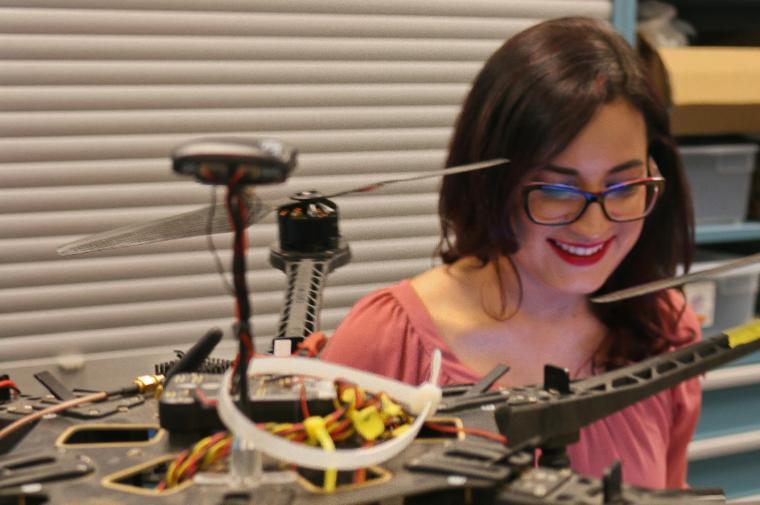
The Sky’s No Limit for This Alumna
Since graduating in 2013 with a bachelor’s degree in computer science and engineering, Alexandria Shearer has been a Ph.D. student at UC San Diego, researching applications and programming methodologies in heterogeneous computing and embedded systems. Recently, she was awarded a prestigious NSF Graduate Research Fellowship to support her studies, so we checked in to congratulate her and get the latest on what she’s up to.
Just what are heterogeneous computing and embedded systems and what are you doing with them?
Heterogeneous computing means leveraging architectures which aren’t necessarily Von Neumann—GPUs, FPGAs, DSPs, or hybrid SoCs (systems on chips). And work in embedded systems implies working within memory, power, or compute restraints. In the past I have researched cross-platform computing methodology by implementing 3D reconstruction on a heterogeneous GPU and FPGA system using an OpenCL to RTL compiler. Now I am working on using aerial LiDAR and IMUs to reconstruct the topology of a jungle floor and process the data for detecting manmade structures.
How’s it going? What are your challenges?
I’m in my third year of my Ph.D. program and I’m hoping to advance to candidacy this year, which entails presenting on my potential dissertation topic to a room of professors established in my field. No pressure!
Tell us more about your work.
My advisor at UCSD (Dr. Ryan Kastner) is involved with a program funded by the NSF called Engineers for Exploration that recruits undergraduates and graduate students to work on engineering projects in the domains of ecology, conservation, and archaeology. My team is working with Mayan archeologists, using aerial liDAR scanning to help them better understand Mayan society. I am responsible for making a consistent 3D representation of the Guatemalan jungle from LiDAR point clouds and IMU data and using computer vision techniques to look for hidden manmade structures. While there are commercial devices and software that can accomplish some of our requirements, they are very expensive. My challenge is using a relatively cheap LiDAR scanner to capture the jungle topography beneath the tree canopy. In May we will deploy the system to the jungle!
It seems as though you made the most of your time at SCU; (Upsilon Pi Epsilon, Tau Beta Pi, Society of Women Engineers, University Honors Program) and you were named the top senior for computer engineering the year you graduated. What was it that impelled you to jump right in?
Both my advisors, Dr. [Darren] Atkinson and Dr. [Silvia] Figueira, were very supportive when I told them I wanted to do grad school. They gave me many opportunities to get involved, including my service as President of SCU’s ACM-W (Association for Computing Machinery-Women in Computing) and the UPE (Upsilon Pi Epsilon) chapters my senior year. Together with the Society of Women Engineers, ACM-W created a mentorship program for women engineering students. I applied for and was awarded the NCWIT Student Seed Fund Grant to support this program. It was a lot of work, but it was also probably the most rewarding to see the incoming female engineering students find mentors to guide them in their budding careers.
What drew you to Santa Clara?
In 2009 SCU was recruiting students from my high school (Saint Joseph’s in Lakewood, Southern California). The recruiter from SCU was unique among the others because he made me feel like he cared. I was overcome when I visited campus; it was beautiful, the presence of the Mission on campus promised me hope and peace, and everyone was very friendly. I felt SCU could be home for the next four years.
What are your hopes and goals for the future?
I expect to complete my Ph.D. in 2018. After that I want to do research and development in academia or industry. I realize the skills I’m developing are multi-faceted;—in addition to engineering experience I am learning to navigate open-ended research problems and communicate solutions. This opens up more possibilities to me that aren’t explicitly related to my research.
Any advice for upcoming engineering students?
I failed my first programming quiz in COEN 10. I remember the humility and confusion I felt when I received my grade, the same feelings I had when I was very young and trying to learn to spell. I saw some of my peers in engineering and science struggle similarly. My advice for future engineering students is to work past any discouragement. The rewards for trying are manifold, but the greatest reward I have from studying CSE at SCU is having enough confidence in my knowledge of the fundamentals of computer science so my only limitations are time and access to information. With that confidence, I can make anything; I can solve any problem—within reason, of course! Knowing that has been the most valuable to me; it’s very empowering. And likewise, that confidence is especially necessary even when you don’t feel intrinsically capable.
Anything else you’d like to share?
When I advance to candidacy for my Ph.D. program , I plan to hang-glide over the cliffs of Torrey Pines at a beach near UCSD. People who knew me at SCU probably wouldn’t believe I would ever do that!